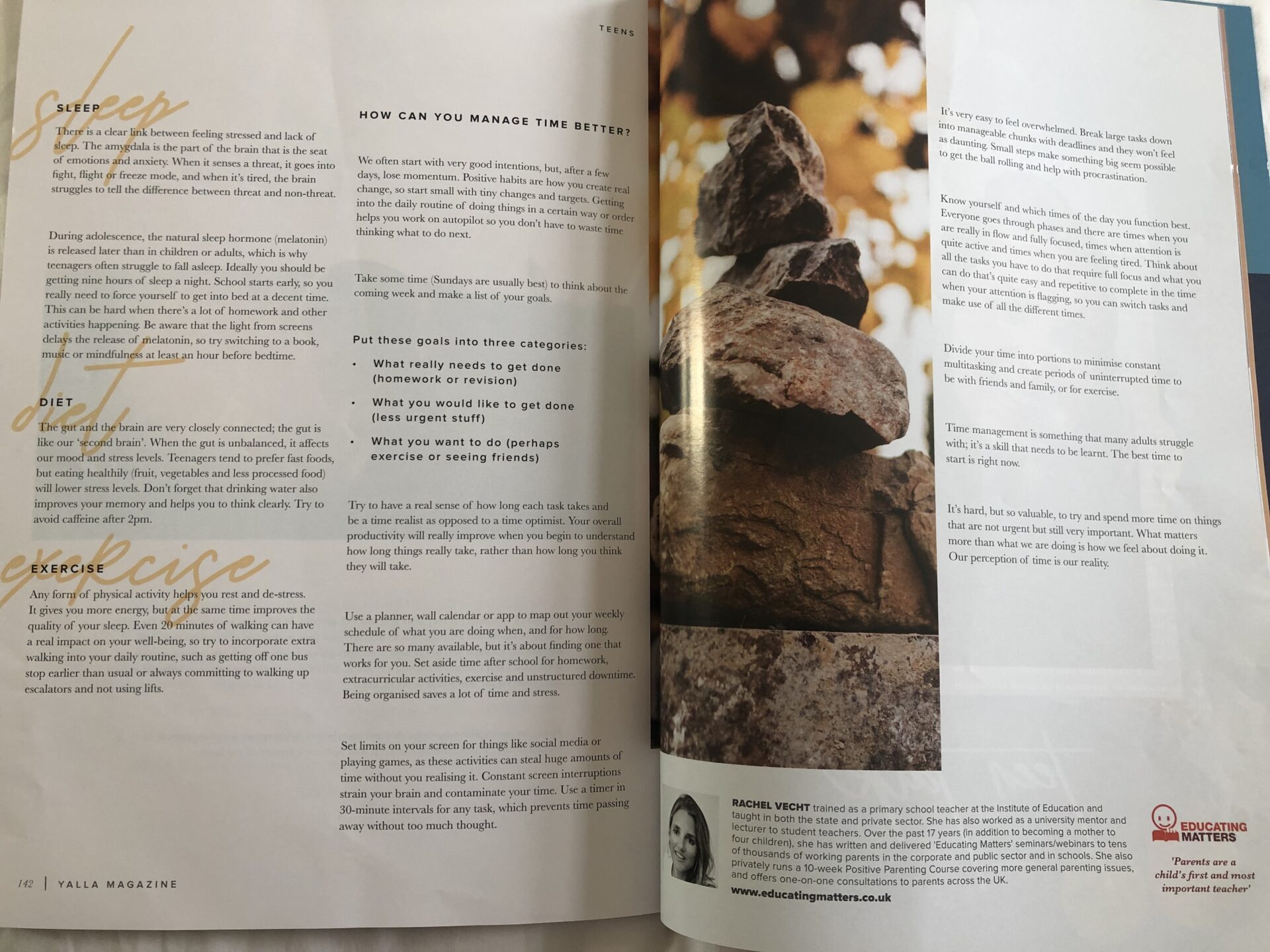My thoughts published in my quarterly advice column for a community magazine.
My mum says it’s important to eat healthily and to exercise and to keep a healthy work/life balance so I don’t get stressed. I however find this very challenging as there never seem to be enough time in the day to get it all in. Can you please give me some tools to help me with managing my time better so that my life will be more balanced and I can live in a healthier way.
The life of a teenager is very busy and can feel stressful. In this case your mum is 100% right. Eating healthily and learning how to manage your time so that you get enough sleep and exercise are life skills that you will benefit from throughout adulthood. It is far easier to establish good habits and routines when you are young. Good time management can help you find extra time for the things that really matter.
Firstly let me explain why sleep, diet and exercise are so important for your physical and mental health. These 3 factors keep your operating system on top form.
Sleep
There is a very clear link between feeling stressed and lack of sleep. The amygdala is the part of the brain that is the seat of emotions and anxiety. When it senses a threat it goes into fight, flight or freeze mode and when it’s tired the brain struggles to tell the difference between threat and non-threat.
During adolescence the natural sleep hormone (melatonin) is released later than in children or adults, which is why teenagers often struggle to fall asleep. Ideally you should be getting 9 hours a night. School starts early so you really need to force yourself to get into bed at a decent time. This can be hard when there’s lots of homework and other activities happening.
Be aware that the light from screens delays the release of melatonin, so try switching to a book, music or mindfulness at least an hour before bedtime.
Diet
The gut and the brain are very closely connected and the gut is like our ‘second brain’. When the gut is unbalanced it affects your mood and stress levels. Teenagers tend to prefer fast foods but eating healthily (fruit, vegetables and less processed food) will lower stress levels. Don’t forget that drinking water also improves your memory and helps you to think clearly. Try to avoid caffeine after 2pm.
Exercise
Any form of physical activity helps you rest and de-stress. It gives you more energy but at the same time improves the quality of your sleep. Even 20 minutes of walking can have a real impact on your well-being, so try to incorporate extra walking into your daily routine, such as getting off 1 bus stop earlier than usual or always committing to walking up escalators and not using lifts.
How can you manage time better?
- We often start with very good intentions but after a few days lose momentum. Positive habits are how you create real change, so start small with tiny changes and targets. Getting into the daily routine of doing things in a certain way or order helps you work on auto pilot so you don’t have to waste time thinking what to do next.
- Take some time (Sundays are usually best) to think about the coming week and make a list of your goals.
Put these goals into 3 categories:
What really needs to get done (homework or revision)
What you would like to get done (less urgent)
What you want to do (perhaps exercise or seeing friends)
Try to have a real sense of how long each task takes and be a time realist as opposed to time optimist. Your overall productivity will really improve when you begin to understand how long things really take rather than how long you think they will take.
- Use a planner, wall calendar or app to map out your weekly schedule of what you are doing when and how long for. There are so many available but it’s about finding one that works for you. Set aside time after school for homework, extracurricular activities, exercise and unstructured down time. Being organised saves a lot of time and stress.
- Set limits on your screen for things like social media or playing games as these activities can steal huge amounts of time without you realising it. Constant screen interruptions strain your brain and contaminate your time. Use a timer in 30 minute intervals for any task, which prevents time passing away without too much thought.
- It’s very easy to feel overwhelmed. Break large tasks down into manageable chunks with deadlines and they won’t feel as daunting. Small steps make something big seem possible to get the ball rolling and help with procrastination.
- Know yourself and which times of the day you function best. Everyone goes through phases and there are times when you are really in flow and fully focused, times when attention is quite active and times when you are feeling tired. Think about all the tasks you have to do which require full focus and what you can do that’s quite easy and repetitive to complete in the time when your attention is flagging, so you can switch tasks and make use of all the different times.
- Chunk your time to minimise constant multitasking and create periods of uninterrupted time to be with friends, family or exercise.
Time management is something that many adults struggle with and needs to be learnt. The best time to start is right now.
It’s hard but so valuable to try to spend more time on things that are not urgent but still very important. What matters more than what we are doing is how we feel about it.
Our perception of time is our reality.cked0

